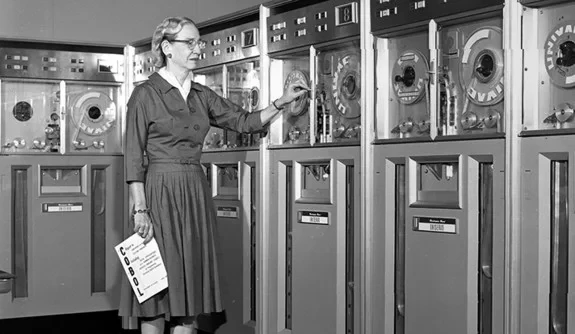Born in 1906, computer scientist Grace Hopper invented the first compiler for computer programming language & was among the first programmers of the Harvard Mk1 computer.
Hopper popularized the idea of machine-independent programming languages & paved the way to develop COBOL (an early high-level programming language). She originated the term "bug" to describe computer glitches & became a celebrated Rear Admiral in the US Navy.
news.yale.edu/2017/02/10/grace… #HistoryRemix #science #history
Grace Murray Hopper (1906-1992): A legacy of innovation and service
On Feb. 11, President Peter Salovey announced that he and the Yale Corporation had voted to change the name of Calhoun College, one of the university's undergraduate residential colleges, to honor alumna Grace Murray Hopper.YaleNews

teledyn 𓂀
in reply to Sheril Kirshenbaum • • •tchriste
in reply to Sheril Kirshenbaum • • •Arleigh Burke-class destroyer
Contributors to Wikimedia projects (Wikimedia Foundation, Inc.)gaylatea
in reply to Sheril Kirshenbaum • • •Grace Hopper - Nanosecunde
YouTubeDagnabbit, Pascaline! 🌼
in reply to Sheril Kirshenbaum • • •Benj Edwards
in reply to Sheril Kirshenbaum • • •What Is a “Computer Bug,” and Where Did the Term Come From?
Benj Edwards (How-To Geek)sparker 🥑
in reply to Sheril Kirshenbaum • • •RunningResister
in reply to Sheril Kirshenbaum • • •SamHughes
in reply to Sheril Kirshenbaum • • •David G. Smith
in reply to Sheril Kirshenbaum • • •World’s First Computer Bug
education.nationalgeographic.orgRichardInSandy
in reply to Sheril Kirshenbaum • • •Bradley Stowers
in reply to Sheril Kirshenbaum • • •"You manage things; you lead people."
- Admiral Grace Hopper
Kimota94
in reply to Sheril Kirshenbaum • • •Toadman628
in reply to Sheril Kirshenbaum • • •J. "Henry" Waugh
in reply to Sheril Kirshenbaum • • •a family member went to a lecture of hers
She handed out "nanoseconds" -- pieces of a particular wire gauge that were 12.5 inches long. Signals would traverse them in one nanosecond
Really a great visual aid for many reasons, both then and now
tbs
in reply to Sheril Kirshenbaum • • •"Amazing Grace", indeed!
“If you ask me what accomplishment I’m most proud of, the answer would be all the young people I’ve trained over the years; that’s more important than writing the first compiler.”
enmodo ⚛️ 🧬 🇺🇦 🍉
in reply to Sheril Kirshenbaum • • •Sheril Kirshenbaum
in reply to enmodo ⚛️ 🧬 🇺🇦 🍉 • • •@enmodo
mastodon.social/@Sheril/109697…
Sheril Kirshenbaum
2023-01-16 05:58:25
Hein Ragas
in reply to Sheril Kirshenbaum • • •(((o))) Acoustic Mirror
in reply to Sheril Kirshenbaum • • •Adam Trickett
in reply to Sheril Kirshenbaum • • •@jonpsp
It's probable that she didn't invent the term bug as we know it today, rather popularised it's use. There is good evidence that the term bug predated modern computers as we know them and was used in the engineering community for a problem.
Ada Lovelace probably identified the first software bug though she didn't call it that...
Irrespective, plenty of who said what and when, both women were major contributors to computing and are often overlooked.
MattO Oh there’s way more sp
in reply to Sheril Kirshenbaum • • •@YusufToropov I was fortunate enough to hear her speak at my tiny liberal arts alma mater. She was brilliant, yet her explanations were easily understood. A true pioneer.
Oh and an incredible wit.
HLGEM
in reply to Sheril Kirshenbaum • • •Kenneth B 🤘
in reply to Sheril Kirshenbaum • • •Michael Shapkin
in reply to Sheril Kirshenbaum • • •GreenSkyOverMe (Monika)
in reply to Sheril Kirshenbaum • • •Image description: Grace Hopper is standing in a room full of really big computers, they are as big as her and look like cupboards. One can see 4.5 of them, there are likely more. In her right hand she is holding a book or paper that says "COBOL", the right arm is hanging down. Her left hand is on one of the computers, she is looking to it. There are tapes in the computers, one can see the tapes behind glass. The photo is black and white. She is wearing a dress.